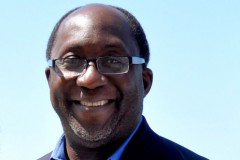 The agreement was signed by Soboyejo, president and provost of the African University of Science and Technology (AUST) in Abuja, Nigeria, during his visit at TWAS’s headquarters in Trieste, 25 April.
The agreement was signed by Soboyejo, president and provost of the African University of Science and Technology (AUST) in Abuja, Nigeria, during his visit at TWAS’s headquarters in Trieste, 25 April.
Soboyejo was educated at King’s College London. He then moved to the United States, where he carried out research aerospace materials at McDonnell Douglas Research Labs in St. Louis, Missouri. After being appointed professor at the Ohio State University, he became visiting professor at MIT, and then professor of mechanical and aerospace engineering at Princeton University.
Today, he is a world-renowned expert in bio-electro-mechanical systems (BioMEMS), small devices that hold great promise for the treatment of many forms of cancer. BioMEMS are tiny lab-on-a-chip devices that can be used – in the medical field – as implantable microelectrodes, miniaturized biosensors, diagnostic chips, and also for drug delivery.
The new partnership jointly signed by Soboyejo and TWAS’s executive director Romain Murenzi focuses on common interests, shared by the two partners in education and training of young African experts.
Cristina Serra, a staff writer in TWAS’ Public Information Office, asked him about his strategic leadership of a highly competitive African university, and his new partnership with TWAS.
Professor Soboyejo, AUST is a jewel in the African framework. However, it is a small university, with just 110 students, at present. How do you make it have an impact on African development?
We recruit highly motivated people who, otherwise, would not have the opportunity to develop their capacities, and provide them with strong foundation in science and technology. They receive a training either to become teachers in Africa, or to work in industry. Since its inception, in 2007, AUST has graduated 270 students and will soon graduate its first PhDs.
Have these students reached any influential positions?
Yes, and I can provide many examples. In Ghana, for example, one of our students has helped create a new university department; four other students were recently hired at the University of Mines and Technology (UMaT), in Tarkwa, to make a petroleum-engineering department. Other examples are: four AUST former students, who are now cooperating to expand the University for Development Studies in Tamale, Ghana, and 12 AUST students who are receiving a training in petroleum engineering with future work prospects in Sierra Leon. So, all these examples show how important it is that we educate people, who continue living in Africa, to educate other people, in a virtuous circle.
Does AUST have any relationships with local or foreign industries?
We try to engage industries as partners, by creating industry advisory boards. This partnership is important because, until recently, many industries complained about the lack of expertise and background of many African students. Now, by partnering with companies such as Total, Chevron and Mobil, we better understand their needs, and are able to offer the students a more dedicated education pathway. In addition, these industries send us experts who teach application aspects, to make our students’ curricula even more complete.
What role do women have in this education process?
Women are very important. At present, they account for some 16-20% of our students at AUST. But our goal – in line with MIT’s figures – is to bring this percentage to 30% first, and to 50% later. In addition, we also plan to liaise with the Nigerian national chapter of OWSD, the organization of women in science for the developing world, whose secretariat is hosted by TWAS, to give women more support.
What could it be, in your view, the role of science academies in bridging the knowledge gap in Africa?
Science academies such as TWAS are important repositories of knowledge. The challenge is how to engage universities outside Africa in a fruitful circle involving African students. I believe the key is in triggering the mobilization-exchange processes, a field where TWAS has strong competences and vast experience.
What kind of an agreement will you establish with TWAS, after your recent visit?
Apart from the personal friendship that brings me close to your executive director, Professor Romain Murenzi, I have in mind a very pragmatic collaboration with TWAS. I keep in high esteem some of TWAS’s programmes, such as the research fellowships and the associateships schemes. We, at AUST, are building strong relationships with industries, while TWAS has a solid network of partnerships and well-established academic and individual connections. In addition, TWAS has a sound experience in mobility programmes. Our emerging collaboration could trigger a novel flow of human resources and redirect it to local problem solving.
Could the partnership with TWAS be instrumental in reversing brain drain in Nigeria?
I do believe it could have a profound effect, not only in Nigeria but also in Africa. TWAS has a name worldwide, and would be a significant partner for us. AUST has a name in Africa. To scale up their preparation, students need opportunities, mobility, and valuable options to chose from. And a work position in their home country, after they have received qualified training abroad. All these are offerings we can provide if we, TWAS and AUST, associate along ad hoc programmes.
Cristina Serra

